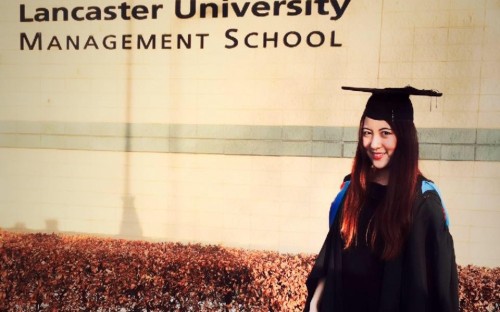To do so, he knew doing an MBA at a top-ranked business school was his best bet. Still today, consulting is one of the most sought-after career destinations for MBA students. Big-name management consulting firms—like Bain & Company—hire hundreds of MBA graduates each year.
Alex chose to return to his alma mater and pursue a one-year, full-time MBA from Lancaster University Management School—ranked number one in the world for corporate strategy by the Financial Times. He got a £10,000 scholarship ($13,000)—the Lancaster MBA costs £30,500 ($40,000).
During the final two months of his degree, he was placed on a consulting project, with Peer Consulting in London, as part of the Lancaster MBA’s Corporate Challenge. The project champion was a Lancaster alum who had worked at EY for a number of years. Through him, Alex was able to get his resume to the right people and secure a job interview.
Alex completed his MBA in September 2017. In December, he joined EY as a senior consultant based in Athens.
“I wouldn’t have got the interview without the network of Lancaster,” he says. “In 2016, two million people applied to EY, of which 13,000 got an interview—that’s under 1%. I would have never got it on my own.”
Why is the Lancaster MBA good for consulting? “It emphasizes personal development a lot,” Alex continues. “Other MBAs are like a production line. You get in, learn about finance, and then go on to a $100,000 job.
“Lancaster is much more about developing a critical way of thinking, and problem solving, and that’s what consultancy is all about.”
While Lancaster MBAs enjoy a range of careers options after graduation, the program provides an especially fertile training ground for future consultants, with MBA grads landing jobs at top consulting firms like Deloitte, EY, and PwC.
The Lancaster MBA—led by Peter Lenney, who Alex singles out as his most influential professor alongside accounting and finance professor David Murphy—is broken up by four action-learning challenges—including the final, six-week Corporate Challenge—where students apply their learnings to solve real-life business problems for real firms.
The program’s unique Mindful Manager module gives students the chance for introspection—to question their own thinking and experience—with trips to the Lake District complemented by leadership coaching from former Pepsi and Saatchi & Saatchi CEO Kevin Roberts.
Alex, who’s currently working on a project restructuring the supply chain of a clothes manufacturer, says the MBA helps him, even today. “A lot of the things we did throughout the course have an actual application in day-to-day business.”
Chotima Kasemphaibulsuk, a 2016 Lancaster MBA grad-turned-management consultant working for a big-name multinational in Thailand, agrees.
She cites Lancaster MBA’s Corporate Challenge—where she worked as a management consultant on a project for Microsoft—and the Business Management Challenge—where her team won a business simulation with the highest share price company on the virtual stock exchange—which she says gave her the practical skills to succeed.
Chotima also went on a European exchange to the University of St. Gallen in Switzerland, which broadened her knowledge of the European market.
“My MBA provided me with the knowledge and inspiration to become a management consultant,” she says.
“The Lancaster MBA didn’t only teach me about business. It quickly improved my confidence speaking English; I gained leadership and management skills; and I grew my network,” Chotima continues. “I’ve applied everything I’ve learned working in consulting.”
James Manning, a current MBA student in the middle of a consulting project with Grant Thornton, hopes to find a job in strategy consulting after graduation.
For James, like Alex and Chotima, the Lancaster MBA is the perfect launch-pad. The MBA’s modules—he highlights the top-ranked strategy module led by ex-PwC partner David Pettifer—combine to provide comprehensive training for anyone considering a career in consulting.
“When you think about the role of a consultant and where they are intended to add value, you think about criticality, impartiality, and strategic thinking,” he says. “The Lancaster MBA is designed to sharpen all of these skills.
“My thinking has definitely sharpened in the past 12 months,” he continues. “I can now see opportunity where I once could not. I’m able to analyze situations far more thoroughly and I’m able to build and present far more persuasive arguments.
“Lancaster MBA has given me the tools and the confidence to position myself as a consultant in the jobs market.”
Student Reviews
Lancaster University Management School









